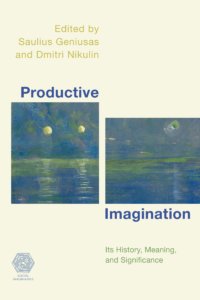Productive Imagination

Productive Imagination. Saulius Geniusas and Dmitri Nikulin, eds. New York: Rowman & Littlefield, 2018.
How do we imagine ourselves and to what extent do we use our imagination in our conception of our social selves and social worlds? These questions are the focus of Saulius Geniusas’ and Dmitri Nikulin’s edited collection, Productive Imagination. The book explores the productive imagination’s capacity to form social worlds and the configurations of them. With eight chapters and an introduction, Productive Imagination establishes the conceptual history of the productive imagination by bringing together different philosophical perspectives that ranges from antiquity to today
Dmitri Nikulin begins the volume with Aristotle’s account of imagination and how it is interpreted by Wolff, Baumgarten, Kant, and other early modern thinkers. These thinkers come up with a set of insights that constitutes our modern understanding of the productive imagination: it meditates between the faculties of sensation and thinking yet is autonomous and independent of these two. It also belongs to the faculty of memory because it produces and preserves images, something which is forgotten by later modern philosophers.
In the second chapter, Alfredo Ferrarin looks at Kant’s concept of productive imagination as an a priori determination of pure intuition rather than being residues of past experiences. Imagination can be understood both theoretically (e.g., being distinct from concepts like exhibition and creation) and practically (e.g., affective, social, and symbolic). Productive imaginative therefore exercises causality in our shared world, creating – to use Wollheim’s term – a “theater of the mind” that connects personal identity to a collective narrative.
Laura Carugati discusses the productive imagination in the Romantic tradition with focus on Schlegel and Novalis in the third chapter. Productive imagination asserts itself from the constraints of objectivity imposed on our thinking and, as a result, creates a world of life and culture that is autonomous from the natural world. Poetic language, the synthesis of poetry and philosophy, is the most appropriate expression of productive imagination where unbounded and unrestrained human creativity can express itself. Being the source of freedom in thinking and creation, the productive imagination ultimately blurs the world of fact and fiction for the philosopher.
The next set of thinkers examined are Hegel and Kant by Angelica Nuzzo in chapter four. Nuzzo argues that Hegel appropriates Kant’s concept of the productive imagination as the transcendent mental faculty that meditates between sensibility and understanding. In Hegel’s philosophy, productive imagination is fully assimilated into reason as one of the consecutive stages in the development of a dialectical, progressive, immanent self-transformation of human consciousness. In other words, Hegel believes that the absolute idea as the absolute unity of the pure concept and its reality necessarily includes the productive imagination of Kant’s concept of genius.
Moving from the experiences of the natural world to the experiences of the human, social, and historical world is the subject of chapter five. Rudolf Makkreel shows how Wilhelm Dilthey’s theory of imagination brings to focus phenomena in a pre-given or contextualized world. Productive imagination articulates and furnishes meaning rather than finding connectedness in the world. Thus, the hermeneutic task of the philosopher is to orient us contextually in the human, social, and historical world and fill in the gaps in the remaining data to present us the whole of reality.
The harmful aspects of productive imagination are examined in the next chapter with Nicholas de Warren’s analysis of Gustave Flaubert’s novels. In these novels we see the productive imagination creates self-deception and stupidity. Warren distinguishes between mimetic and constitutive imagination with the latter including productive (self-deception) and creative imaginations (coming to terms with our own self-deceit and stupidity through literary fiction). Flaubert’s novels therefore present a two-fold imagination: the productive in the protagonists deceiving themselves and the creative in the author and reader being able to discern the self-deceit and stupidity of these characters.
Saulius Geniusas returns us back to philosophy in chapter seven where he explores the Davos disputation between Cassirer and Heidegger as a debate over the meaning, significance, and nature of the productive imagination. Both Cassirer and Heidegger conceive of productive imagination as a transcendent power that determines the essence of subjectivity. But both think of the productive imagination differently which yields different ideas about subjectivity. Cassirer conceives of productive imagination as pure spontaneity, while Heidegger describes it as “spontaneous receptivity”: a unity of understanding and sensibility from Dasein to which it gives itself that is spontaneous yet neither arbitrary nor constitutive. Cassirer’s productive imagination lifts the subject above finitude to open up the field of infinity, whereas Heidegger’s productive imagination is recognized within finitude which, in turn, calls for both understanding and intuition in the subject.
In the final chapter, George Taylor argues the concept of figuration is key to understand Ricoeur’s philosophy of productive imagination. Figuration describes the linguistic structure of human action, speaks to the connotative side of language, and depicts language pictorially. Figuration therefore is the common foundation between language and experience, bridging impression (experience) and concepts (thought).
Productive Imagination is a welcome work that explores the conceptual history of the productive imagination in the West from antiquity to today. By presenting different conceptual frameworks and histories, the book establishes a foundation for future analyses of the productive imagination. While a conclusion would have been useful to tie these chapters together, Productive Imagination makes a significant contribution to the philosophy by starting the conversation about this topic. It prompts one to imagine more about this subject and speculate about subsequent studies in the future.




